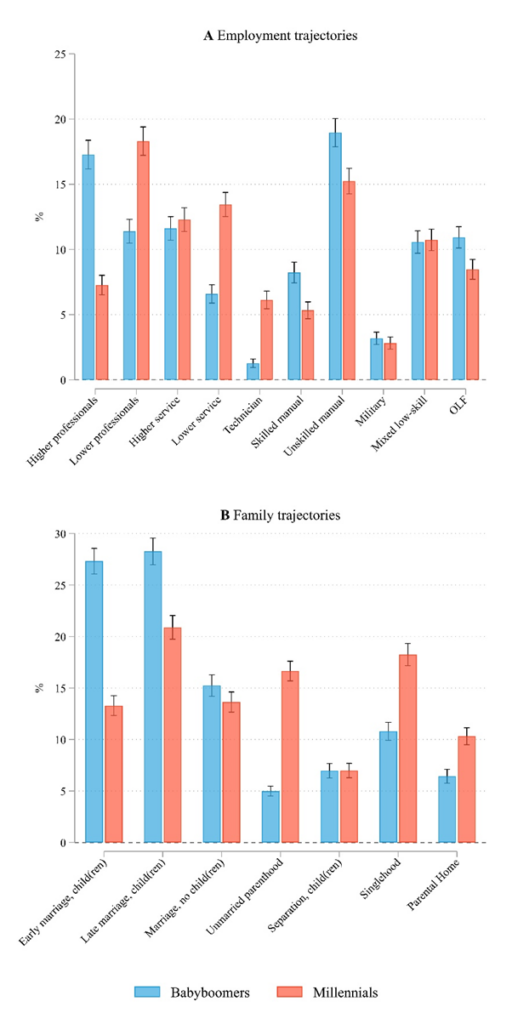
The question of whether Millennials are doing better or worse than previous generations remains a highly debated subject. Millennials are often positioned as the victims of changes in American society that have made employment and family life less stable, rendering them, according to some observers, “the first generation that is worse off than their parents”. A recent article challenged the “myth of the broke Millennial”, however, claiming that they are actually thriving.
Framing the question in this way is somewhat misleading. It suggests that there is a typical or average Millennial, who we can compare to the average Baby Boomer. Millennials are so different from one another, however, that it is not particularly meaningful to talk about the ‘average’ Millennial experience. There are some Millennials who are doing extremely well—think Mark Zuckerberg and Sam Altman—while others are struggling.
The Baby Boomers are similarly internally divided: those who went to university and found middle class jobs had very different experiences and life outcomes compared to those in working class occupations. Comparing generations in terms of their average economic outcomes overlooks the vast discrepancies within generations. Instead, we should ask which Millennials were better or worse off than previous generations.
Our study, recently published in the American Journal of Sociology, therefore compared differences in wealth and work-family lives within as well as betweengenerations. We compared more than 6,000 late Baby Boomers (born 1957-64) and 6,000 early Millennials (born 1980-84), using data from the National Longitudinal Survey of Youth. Rather than using broad averages to compare the generations, we mapped each individual’s life trajectory from 18 to 35 as a sequence of changes in their work, family and living arrangements.
Individuals with similar trajectories were then clustered together, enabling us to assess how the prevalence of different life trajectories changed across cohorts. We also evaluated how these trajectories related to wealth accumulation by the age of 35 in each generation. This allows us to ascertain which trajectories were conducive to wealth, and how this changed over time.
In line with Piketty and others, we found that wealth inequality has increased across cohorts. The wealthiest Millennials have more wealth than the wealthiest Baby Boomers as the same age, but the poorest Millennials have less (see figure 2). This is partially a result of declines in home ownership: while 62% of Boomers owned homes at 35, only 49% of Millennials did. Around 14% of Millennials had negative net worth, meaning their debts outweighed their assets, compared with 8.7% of Boomers.

Figure 1: Cohort differences in wealth at different percentiles
The data revealed striking intergenerational shifts in career patterns and family dynamics (see figure 2). By age 35, 17% of Baby Boomers had followed a path in which they progressed from college into prestigious professional careers like law and medicine, whereas only 7.3% of Millennials did the same. Millennials were, on the other hand, more likely to be engaged in other professional roles, like social work and teaching, or in service sector jobs like retail, waiting and caregiving.

Additionally, Millennials have tended to postpone marriage and prolong their stay in the parental home. Early marriage and parenthood characterised the lives of 27% of Boomers, but just 13% of Millennials. At the same time, trajectories characterized by long-term singlehood and unmarried parenthood increased (see figure 2).
There is little evidence that these changing work and family patterns are driving changes in wealth accumulation across cohorts, however. Rather, we found that the economic rewards for secure, middle and upper-class lifestyles have increased, while those for less stable, working-class trajectories have either stagnated or declined. Those Millennials who had what we call middle-class life trajectories—they went to college, found graduate level jobs, and started families relatively late—generally had higher levels of wealth than Baby Boomers with similar life trajectories.
But those with typical working-class careers, like truck drivers or hairdressers, generally had lower wealth than Baby Boomers with similar careers. For instance, among Baby Boomers, 63% of low-skilled service workers owned their own home at 35, compared with 42% of Millennials in the same occupations. The poorest Millennials in service sector roles now often have negative net worth, which was less common among Boomers.
We thus observe an increasing polarization in work-family life courses as well as wealth outcomes. The roots of this polarization lie in economic restructuring and the disappearance of well-paid manufacturing jobs, demographic change including the decline of marriage, and tax reforms that benefited the wealthy. This polarization is likely to foster intergenerational tensions and to contribute to other social problems, such as the rise of populist authoritarianism.
Addressing the problems sketched out above requires urgent public intervention. Policies to address inequality can be divided into those that ‘lift the bottom’, such as a higher minimum wage and increased employment security, and those that ‘level the top’, such as wealth and inheritance taxes. Access to stable housing and universal health insurance would also make it easier for those who are currently being left behind to accumulate wealth in the first place.
Read more
Rob J. Gruijters, Zachary Van Winkle, and Anette E. Fasang. “Life Course Trajectories and Wealth Accumulation in the United States: Comparing Late Baby Boomers and Early Millennials” in American Journal of Sociology 2023.
Image: Kampus Production via Pexels.
